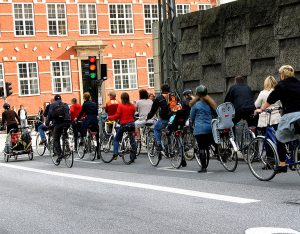 Across the country and around the world, more and more cities (such as Paris and Los Angeles, just to name two) are looking for ways to become more “bike friendly.” This is a trend that our Oakland bicycle accident law firm applauds and encourages. A city that encourages more bicyclists to take to the road can experience several benefits: Less wear and tear on roadways (which reduces the amount of money that must be spent to repair roadways), less congestion on roads that may not have been built to accommodate today’s volume of traffic, and less carbon emissions, not to mention a population that is generally healthier.
Across the country and around the world, more and more cities (such as Paris and Los Angeles, just to name two) are looking for ways to become more “bike friendly.” This is a trend that our Oakland bicycle accident law firm applauds and encourages. A city that encourages more bicyclists to take to the road can experience several benefits: Less wear and tear on roadways (which reduces the amount of money that must be spent to repair roadways), less congestion on roads that may not have been built to accommodate today’s volume of traffic, and less carbon emissions, not to mention a population that is generally healthier.
Two Ways to Encourage More Bicyclists
Traditionally, when a city decides to become more friendly to bicyclists the city creates new infrastructure specifically designed for bicyclists, like designated roadways. Some jurisdictions even create laws like California’s three-foot passing rule in an attempt to show bicyclists that they are welcome in the town. However, a new technique has been proposed to encourage more people to ride their bicycles in California and elsewhere: Permit them to disregard certain traffic laws.
The proposal is based on the rulings of an Idaho judge who, in his own jurisdiction, did not want his court docket clogged with traffic tickets issued against bicyclists who failed to come to a complete stop at stop signs and red lights. Now, other jurisdictions are jumping on the bandwagon and allowing bicyclists to treat stop signs and red lights as yield signs. Proponents say that aside from the obvious benefit to bicyclists, such laws and attitudes could help bicyclists more easily maneuver in and around traffic.
Is Encouraging Bicyclists to Ignore Traffic Laws a Good Idea?
Bicyclists are generally subjected to the same laws and rules of the road that govern motor vehicles. Just as a motor vehicle driver who violates these laws (such as by running a stop sign) can be considered negligent and responsible for resulting injuries, so too bicyclists who disobey traffic laws and customs might be considered negligent and responsible for ensuing injuries. While a bicyclist who crashes with a car is not likely to cause any injuries to the car’s occupants, the bicyclist will almost certainly be injured. The fact that the bicyclist may have been negligent because he or she failed to come to a complete stop at a stop sign may be used to reduce the bicyclist’s injury compensation award – or to deny compensation altogether.
A better solution might be for legislators to revisit the state’s traffic laws and determine whether any of them deserve to be modified for bicyclists. In this way, common bicyclist behaviors like treating stop signs and signals as suggestions rather than commands could not be used to absolve negligent motorists of their responsibility to look out for bicyclists who may be sharing the road with them.
See Related Blog Posts
 San Francisco Injury Lawyer Blog
San Francisco Injury Lawyer Blog

